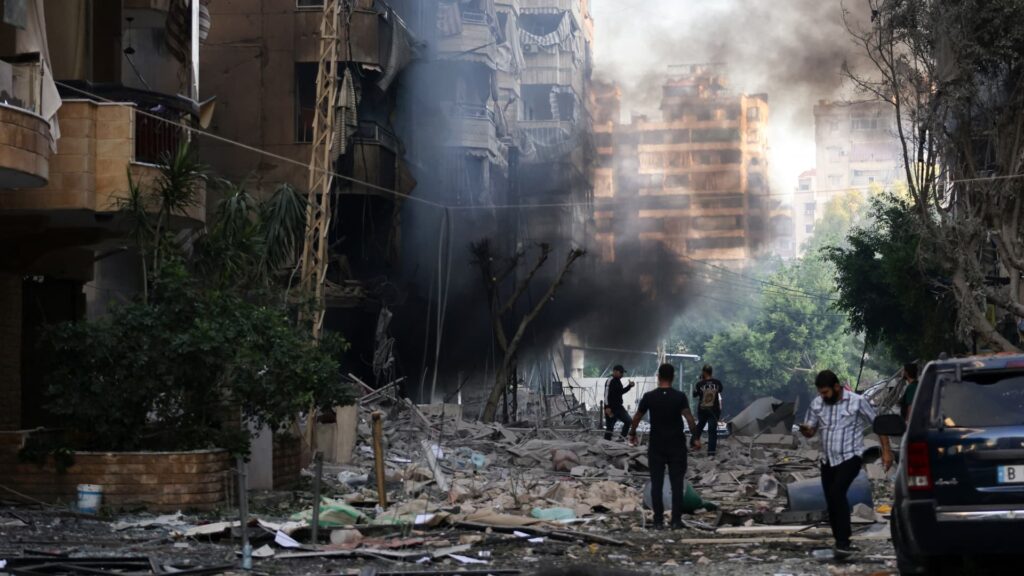Residents check damage in the aftermath of overnight Israeli shelling on the southern outskirts of Beirut on September 28, 2024.
Anwar Amro | AFP | Getty Images
Israel launched airstrikes on the southern outskirts of Beirut and other parts of Lebanon on Saturday, a day after carrying out a major attack on Hezbollah headquarters in an apparent attempt to kill Hezbollah leader Sayyed Hassan Nasrallah.
The fate of Nasrallah, the Iranian-backed group’s leader for 32 years, remains uncertain, and Hezbollah has yet to issue a statement on his status.
Reuters reporters heard there were more than 20 airstrikes on Beirut before dawn on Saturday, and more after sunrise. Smoke was seen rising in the city’s southern suburbs, which are controlled by Hezbollah, known as Dahiyeh.
Since Friday’s attack, thousands of people have evacuated the area and gathered in downtown Beirut and seaside squares, parks and sidewalks.
“They are trying to destroy Dahiyeh, and they are trying to destroy us all,” said Salih, a man in his 30s who gave only his first name, referring to the suburb he fled after receiving Israeli evacuation orders. did. Nearby, newly displaced people from Beirut’s Martyrs Square rolled mats on the ground and tried to sleep.
The Israeli military said a missile fired toward central Israel on Saturday landed in an open field. Earlier, the military announced that about 10 projectiles had entered Israeli territory from Lebanon, some of which had been intercepted.
The Israeli military also said it had been attacking Hezbollah targets in the Bekaa Valley on the Syrian border in eastern Lebanon over the past week.
Friday’s attack was followed by five hours of continuous Israeli attacks on Beirut in the early hours of Saturday, the first such attacks by Israel on Beirut during the nearly year-long conflict with Hezbollah that has been unfolding alongside the Gaza war. became the most powerful.
The escalation has sharply raised concerns that the conflict could spiral out of control and involve not only the United States but also Iran, Hezbollah’s main backer.
It was not immediately possible to confirm Nasrallah’s well-being after Friday’s violent attack, but a source close to Hezbollah told Reuters he could not be contacted.
Israel has not said whether it tried to attack Nasrallah, but a senior Israeli official said Hezbollah leaders were targeted.
“I think it’s too early to say…even if we succeed, they sometimes hide the facts,” an Israeli official told reporters when asked if Nasrallah was killed in Friday’s attack. .
Earlier, sources close to Hezbollah told Reuters that Nasrallah was alive.
Iran’s Tasnim news agency also reported that he was safe. A senior Iranian security official told Reuters that the Iranian government was investigating his identity.
The Israeli military said in a statement that it had killed Muhammad Ali Ismail, the commander of Hezbollah’s missile force, and his deputy Hossein Ahmed Ismail.
This week, Israeli attacks in Lebanon expanded to new areas. On Saturday, the Lebanese mountain town of Bamdoun, southeast of Beirut, was struck by airstrikes, Mark Dow, a Lebanese lawmaker from the area, told Reuters.
Walid Khairala, the mayor of Bamdoun, told Reuters the strike hit a large open area and there were no casualties.
death toll rises
Hezbollah’s al-Manar television reported that seven buildings were destroyed.
“We’re going to the mountains. Let’s see how we spend the night and see what we can do tomorrow.”
